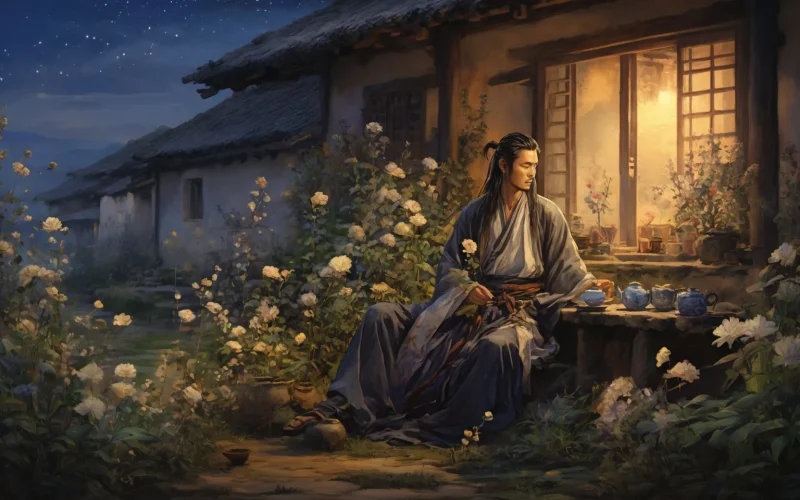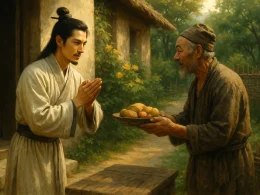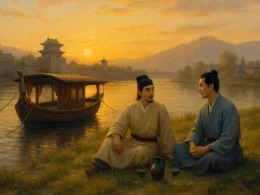Heavy the cloud is hanging,
Misty the rain is drizzling.
Land into water changing,
The sky and earth are grizzling.
Let me drink wine on wine
By east window at leisure:
How much for friends I pine!
But they can’t come with pleasure.
Original Poem
「停云 · 其四」
陶渊明
翩翩飞鸟,息我庭柯。
敛翮闲止,好声相和。
岂无他人,念子实多。
愿言不获,抱恨如何!
Interpretation
This poem was composed in the spring of 404 AD when Tao Yuanming was living in seclusion in his hometown of Xunyang Chaisang (present-day Jiujiang, Jiangxi). During this turbulent period of Eastern Jin politics, after Huan Xuan's usurpation was overthrown by Liu Yu and the emperor was taken south, society was plunged into extreme instability. Faced with the misty spring scenery, the poet was moved to think of distant friends whom the war prevented him from meeting, leading him to compose this poem to express his melancholy.
First Stanza: "停云霭霭,时雨濛濛。"
tíng yún ǎi ǎi, shí yǔ méng méng.
Gathering clouds hang heavy and still, The seasonal rain falls faint and chill.
The poet begins with oppressive weather imagery, creating a somber, misty atmosphere that sets the tone for the entire poem.
Second Stanza: "八表同昏,平陆成江。"
bā biǎo tóng hūn, píng lù chéng jiāng.
All eight directions share this gloom, Flat lands become rivers in the watery doom.
These lines carry profound symbolism, depicting not only torrential rains but also metaphorically representing the turbulent political situation, conveying the poet's heavy heart and deep concerns.
Third Stanza: "有酒有酒,闲饮东窗。"
yǒu jiǔ yǒu jiǔ, xián yǐn dōng chuāng.
Wine I have, wine I possess, Leisurely drinking by my east window in loneliness.
The poet seeks solace in wine, but the word "leisurely" (闲) reveals an undertone of solitude and helplessness, emphasizing his lack of companionship.
Fourth Stanza: "愿言怀人,舟车靡从。"
yuàn yán huái rén, zhōu chē mǐ cóng.
How I long to embrace my friend, But boats and carriages meet their end.
This direct expression of emotion conveys the poet's profound longing for his friends, while the severed transportation routes due to war intensify his sorrow and helplessness.
Comprehensive Analysis
Through depictions of continuous spring rain and darkened skies, the poem creates a mood of confusion and oppression, expressing the poet's anxiety about the turbulent times and his deep yearning for distant friends. Though wishing to share spring wine and life's conversations with companions, the poet is forced into solitary drinking and sighing beneath the moon due to wartime separation. The verses reveal not only personal sorrow but also reflect how war disrupts human connections, evoking poignant reflections on life's impermanence.
Artistic Innovations
- Emotion-Scene Fusion: The opening lines "Gathering clouds hang heavy and still/The seasonal rain falls faint and chill" perfectly mirror the poet's loneliness through weather imagery, enhancing the poem's emotional power.
- Concise Language with Harmonious Rhythm: Using the four-character classical form with neat parallelism and melodious cadence, the poem achieves remarkable oral fluidity and lasting resonance.
- Symbolic Depth: "All eight directions share this gloom/Flat lands become rivers in the watery doom" realistically depicts the rains while metaphorically representing national turmoil, adding philosophical depth.
- Direct Emotional Expression: Progressing from gloomy scenery to solitary drinking and friend-longing, the poem builds emotional intensity layer by layer with authentic, moving sentiment.
Insights
More than expressing personal longing, this poem reflects the forced separations of turbulent times. It reminds us that life often presents insurmountable barriers to human connection, making cherished friendships all the more precious. Furthermore, the poem demonstrates how environmental description can amplify emotional expression more powerfully than direct statements. Despite living through chaos, the poet's enduring commitment to friendship teaches us to cherish our relationships and not let time or circumstances dilute genuine human connections. The work ultimately stands as a testament to the resilience of human bonds even in darkest times.
Poem translator
Xu Yuan-chong (许渊冲)
About the poet

Tao Yuanming(陶渊明), 365–427 CE, was a poet, literary figure, fu writer, and essayist active during the late Eastern Jin and early Liu Song dynasties. Born in Chaisang (near present-day Jiujiang, Jiangxi Province), he pioneered a new genre of pastoral-themed literature, expressing profound philosophical insights through simple language. His poetic style became an enduring aesthetic standard in classical Chinese poetry.











